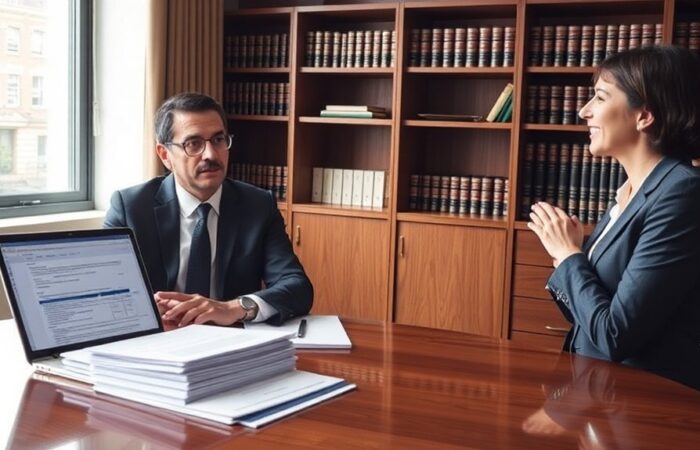When you’re trying to navigate an unfamiliar legal system, language barriers can quickly become overwhelming. That’s where the Afghan Multilingual Document Sets curated by Vieira Braga Advogados step in, offering practical legal resources in Dari, Pashto, English, and Portuguese. These sets aren’t just about translation—they’re about giving you the tools to make confident decisions. Curious how these resources bridge gaps and foster a sense of belonging for Afghan refugees and expatriates?
Understanding the Need for Multilingual Legal Resources

Access to justice hinges on understanding legal information in a language you speak. When you face legal issues, clear access to laws, rights, and procedures in your own language empowers you to make informed choices. If you can’t comprehend vital documents, you’re at risk of missing deadlines, misunderstanding your rights, or failing to defend your interests. Legal jargon is confusing enough without the added barrier of an unfamiliar language.
You need resources that bridge that gap, whether you’re navigating asylum processes, immigration paperwork, or establishing residency. Multilingual legal resources remove barriers that prevent you from fully participating in legal processes. When you read documents in your own language, you’re more confident and better equipped to advocate for yourself.
In multilingual contexts like Afghanistan, where Dari, Pashto, English, and sometimes Portuguese are spoken, having legal materials in multiple languages is vital. It’s about fairness, inclusion, and real access to justice for everyone.
Working with specialized firms can increase chances of successful immigration processes, ensuring that language is never a barrier to securing your legal rights.
Overview of Document Set Languages and Target Audiences
Languages shape how you interact with legal systems and understand your rights. When you’re dealing with Afghan legal matters, the variety of languages used—Dari, Pashto, English, and Portuguese—ensures you won’t miss crucial information because of a language barrier. The document sets curated by Vieira Braga Advogados specifically address the needs of different audiences that must navigate Afghan legal contexts, whether you’re a local citizen, an expat, or an international legal advisor. Here’s how each language serves distinct groups:
- Dari: Facilitates access for native Dari speakers and Afghan nationals.
- Pashto: Reaches communities and individuals who primarily speak Pashto.
- English: Supports expatriates, international organizations, and legal advisors operating in Afghanistan.
- Portuguese: Assists Brazilian and Lusophone users, including lawyers and clients interacting with Afghan systems.
Access to multilingual legal documents becomes especially important given the complexity of immigration laws and the frequent changes in policies, making specialized assistance crucial for all users.
Key Features and Content of the Afghan Multilingual Document Sets
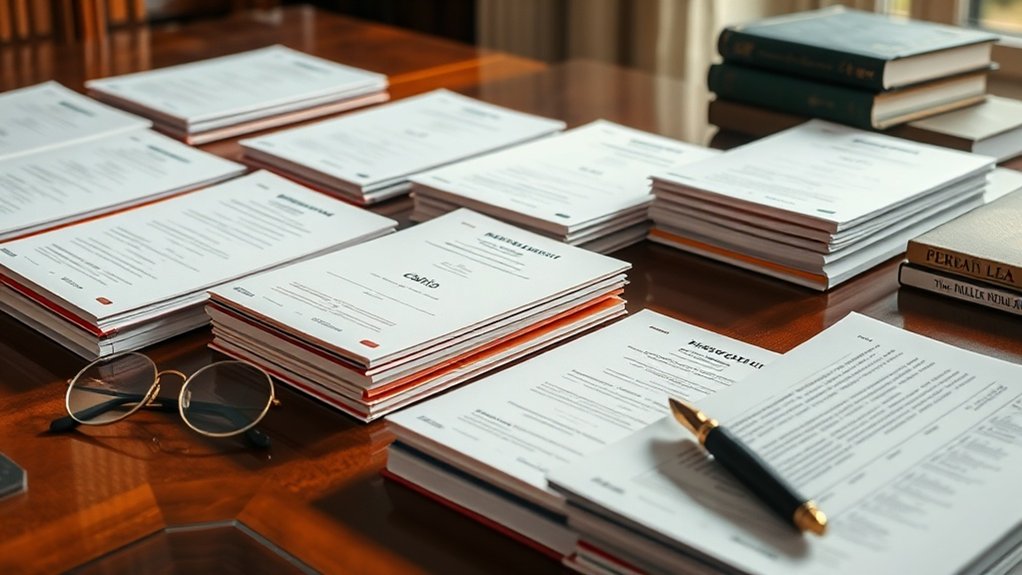
Building on the way these document sets meet diverse language needs, it’s important to see what you’ll actually find inside them. You’ll notice they’re organized for clarity and quick reference, whether you’re working in Dari, Pashto, English, or Portuguese. Each document set targets practical scenarios, ensuring you have the right templates and up-to-date information for Afghan-related cases.
Here’s a quick look at the key features and main content areas you can expect:
| Feature/Section | What You’ll Find |
|---|---|
| Legal Templates | Agreements, affidavits, and formal correspondence |
| Immigration Guidance | Visa instructions, application forms, and FAQs |
| Transliteration Notes | Glossaries and pronunciation guides |
| Official Translations | Certified versions of key legal documents |
| Cultural References | Explanatory notes for context and local relevance |
In addition, drawing on personalized and strategic guidance ensures that users of these document sets can confidently navigate immigration processes involving multiple languages and legal systems.
You’ll find these sets designed for ease of use, letting you work across languages without confusion or gaps in understanding.
Ensuring Cultural Sensitivity in Legal Communications
While working with Afghan multilingual document sets, you need to be mindful that legal communications aren’t just about translating words—they’re about conveying the right intent and respect for cultural nuances. Every language carries cultural assumptions, especially in sensitive legal contexts. It’s vital to deliver your message in a way that’s both accurate and aligned with the recipient’s values and traditions. Direct translations can easily miss subtle meanings, leading to misunderstandings or, worse, offense.
To ensure cultural sensitivity in your legal communications, follow these four practical steps:
- Research cultural norms: Before drafting or translating, understand the relevant customs and social expectations in Afghan and Portuguese-speaking settings.
- Use culturally neutral language: Avoid expressions that may carry unintended connotations or biases.
- Engage native speakers: Rely on vetted translators or consultants who grasp both language and cultural context.
- Proofread with context in mind: Review documents with attention to how different audiences may interpret tone and intent.
Expertise from qualified legal assistance can further minimize risks in cross-cultural legal documents and ensure your communication is both effective and legally sound.
Supporting Refugee Integration in Portuguese-Speaking Countries
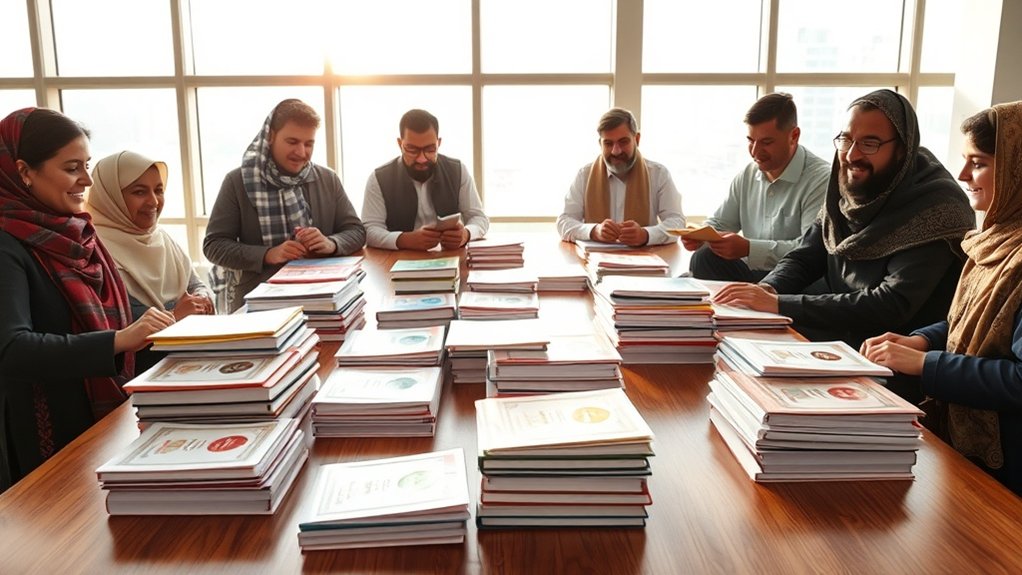
When you help Afghan refugees settle in Portuguese-speaking countries, you need to focus on clear language access initiatives, reliable legal documentation support, and guidance for navigating social services. You’ll see faster integration when refugees understand their rights and resources in their own language. Let’s look at how multilingual document sets can make each of these areas more accessible. Access to up-to-date information about immigration laws and costs is crucial for successful refugee integration and can help avoid legal complications during the regularization process.
Language Access Initiatives
Although Afghan refugees bring diverse talents and experiences to Portuguese-speaking countries, language barriers often challenge their integration efforts. You can take meaningful steps to bridge this gap by participating in language access initiatives. These focused strategies help newcomers understand the local environment, connect with others, and thrive both socially and professionally. Here’s how language access initiatives can make a real impact:
- Offer bilingual materials and resources so you can navigate daily life—like transportation, healthcare, and education.
- Promote language classes designed for newcomers, focusing on practical communication.
- Provide interpretation and translation services at key community locations to ensure clear understanding.
- Encourage peer support groups where you practice speaking and learn cultural nuances together.
Taking part in these initiatives also helps you avoid common immigration challenges in Brazil by ensuring you stay informed and compliant with essential processes.
Legal Documentation Support
Building on the foundation of language access, clear guidance on legal documentation helps Afghan refugees navigate the requirements of settling in Portuguese-speaking countries. You’ll face paperwork that’s essential for legal residency, employment, and family reunification. With multilingual document sets—prepared in Dari, Pashto, English, and Portuguese—you can understand each step, requirement, and form you need to submit. These curated resources ensure you’re not left guessing about deadlines or legal terms.
You gain confidence as you see official documents translated into your own language. It’s easier to gather proof of identity, prepare immigration applications, and comply with local regulations. Accurate information helps you avoid common mistakes that could delay your status. Legal documentation support removes barriers and puts you in control of your integration journey. With the help of specialized legal support, you can confidently manage your immigration applications and greatly improve your chances of a successful outcome.
While resettling in a new country, understanding how to access social services is just as important as handling legal paperwork. You need reliable information to navigate the systems in Portuguese-speaking countries, especially if you’re helping Afghan refugees. The Afghan Multilingual Document Sets offer clear guidance on finding key services, so you won’t feel lost or overwhelmed. Here’s how you can use these resources to support integration:
- Identify local health clinics and schedule medical appointments in advance.
- Register for language classes to improve communication and daily life skills.
- Locate child support services, including education and daycare options.
- Access employment agencies to seek job opportunities tailored to individual backgrounds.
With these steps, you’re not just surviving but truly building a new life for Afghan refugees in welcoming communities. By working with specialized legal support, refugees can also ensure their documentation is correct and enhance their chances for a smooth, successful integration journey.
Collaborative Approaches With Local Support Networks
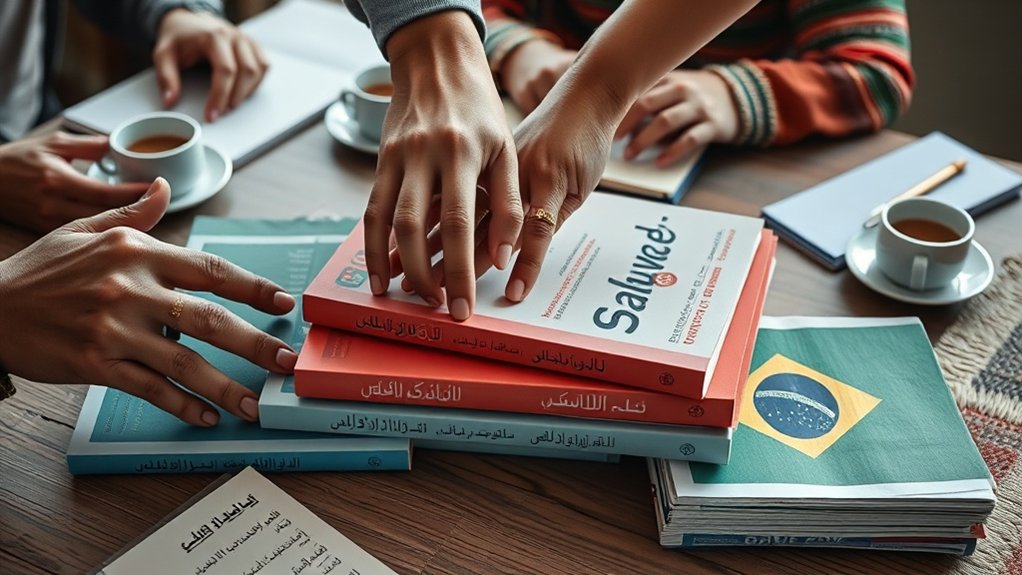
By partnering directly with local support networks, you gain invaluable access to community insights, diverse language resources, and cultural expertise. These partnerships let you quickly identify the real challenges Afghan clients face and adapt your approach to meet their needs. Local organizations can connect you with trusted interpreters and cultural mediators, ensuring that communications remain respectful and accurate in Dari, Pashto, English, or Portuguese.
Collaboration makes it easier to understand changing community dynamics and respond to emerging needs. You’ll benefit from the established trust local groups have cultivated, which helps build rapport with individuals seeking support. Engage with local leaders and advocates—they often have a deeper understanding of cultural norms and legal intricacies relevant to Afghan communities.
Stay proactive. Regular meetings with these networks will keep you informed about new issues and available resources, allowing you to refine your document sets and services for greater impact and accessibility. When dealing with legal and bureaucratic complexities, collaborating with local support organizations can help streamline the process and reduce stress for Afghan families.
Steps for Accessing and Utilizing the Document Sets
Start with three straightforward steps to access and make the most of the Afghan multilingual document sets. First, you’ll need to visit the official Vieira Braga Advogados website where the curated document sets are hosted. Next, register for a free account to unlock access to materials in Dari, Pashto, English, and Portuguese. After you log in, filter the documents based on language and topic, ensuring you quickly find the resources most relevant to your needs.
To ensure you get the best use from these sets, follow this simple process:
- Browse by Language: Easily select Dari, Pashto, English, or Portuguese to view only documents in your preferred language.
- Search by Topic: Use the platform’s search function to locate legal, educational, or settlement-related documents.
- Download or Bookmark: Download key files for offline use or bookmark them for future reference.
- Review Updates: Regularly check back for new or revised document releases.
For users interested in immigration, these document sets can provide essential context on employment-based Green Card categories and help clarify which supporting documents are most relevant for specific U.S. visa processes.
Impact on Afghan Refugees and Broader Community Empowerment
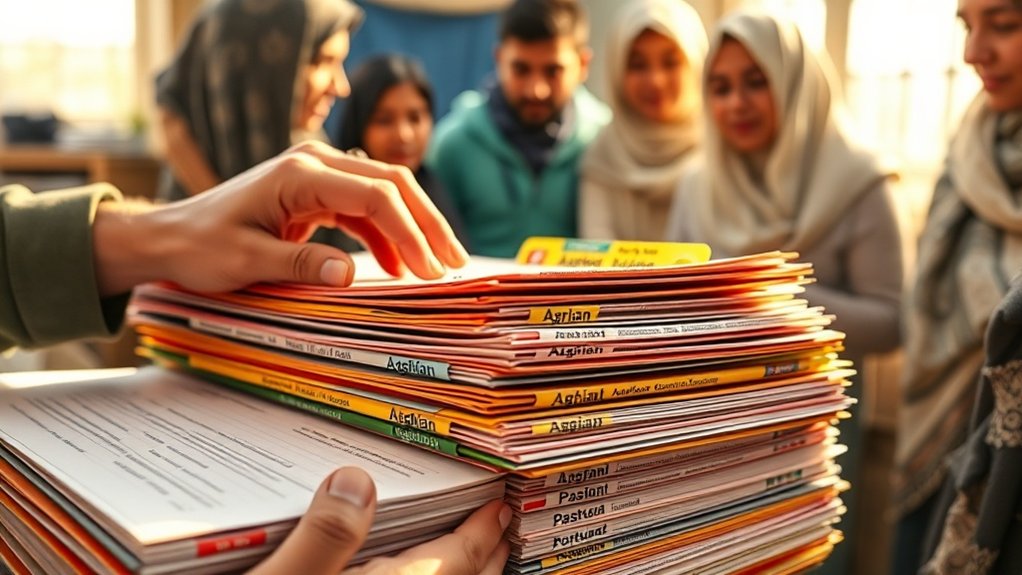
With these document sets, you’re able to access services that might have seemed out of reach before. They help you understand local systems, making it easier to participate fully in your new community. You’ll also find that better communication encourages cultural integration for both you and those around you.
Enhanced Access to Services
Although language barriers often limit opportunities, Afghan multilingual document sets open doors to crucial services that many refugees previously struggled to access. When you’re able to read and understand essential documents in Dari, Pashto, English, or Portuguese, you gain true independence over your next steps. These resources let you fill out forms, seek medical help, and understand your legal rights without confusion. Enhanced access to information means you’re no longer left out or behind.
You’ll especially benefit in these ways:
- Access healthcare services by understanding medical information and paperwork.
- Navigate legal processes, such as immigration or residency, with correctly translated legal forms.
- Secure educational opportunities by reading school enrollment documents.
- Manage everyday bureaucracy, like banking or renting a home, confidently and independently.
Promoting Cultural Integration
When you can understand the language spoken around you, it becomes much easier to make genuine connections and participate in your new community. Multilingual document sets curated in Dari, Pashto, English, and Portuguese empower you to bridge cultural divides. You don’t just access information—you also build trust with those from different backgrounds. By sharing common resources, you’re able to engage in local activities, seek employment, and contribute your own heritage.
These resources don’t just benefit Afghan refugees. The broader community thrives when everyone joins the conversation. Language becomes a tool for mutual respect and shared understanding, helping prevent isolation. As you interact through these multilingual sets, you encourage openness, learning, and a richer, more integrated cultural environment for everyone involved.
Frequently Asked Questions
Are There Any Costs Associated With Downloading These Document Sets?
No, you don’t have to pay anything to download these document sets. You can access them free of charge, so you won’t encounter hidden fees or unexpected charges. All you need to do is follow the download instructions provided, and you’ll have the files available on your device right away. It’s simple, convenient, and cost-free, so you can use the documents as you need without worrying about your budget.
How Frequently Are the Document Sets Updated or Reviewed?
You’ll find that the document sets are typically updated and reviewed on a quarterly basis, though sometimes updates happen more frequently depending on major legal or policy changes. When you access the repository, you can always check the “last updated” timestamp to ensure you’re working with the latest version. If you’re ever unsure, you can contact support for clarification. This schedule helps you rely on accurate, up-to-date resources for your needs.
Can Individuals Contribute to or Suggest Edits for These Documents?
Yes, you can contribute or suggest edits for these documents. Typically, there’s a submission process where you’ll need to share your recommendations, often through an online platform or by contacting the curators directly. When you suggest changes, make sure you provide clear explanations and, if possible, evidence to support your suggestions. This active involvement helps maintain accuracy and ensures the information is current, relevant, and beneficial for all users.
Are Audio or Video Translations of the Documents Available?
No, you won’t find audio or video translations of the documents available right now. If you’re seeking multimedia formats for easier comprehension or language accessibility, you’ll need to rely on the existing written versions. However, you can suggest the addition of audio or video translations if you think they’d benefit users. Stay tuned for updates or contact the curators directly to share your needs regarding multimedia support for these materials.
Do These Sets Include Information About Legal Aid Services Outside Portugal?
Yes, you’ll find that these sets include information about legal aid services available outside Portugal. When you look through the documents, you’ll notice they reference support options for refugees and migrants in other countries as well. You can use this information to connect with assistance networks or legal resources wherever you are, not just within Portugal’s borders. This broader scope helps ensure you’re not limited to support only in one country.
Conclusion
By using the Afghan Multilingual Document Sets, you’ll break down language barriers and confidently handle legal and social challenges as a refugee or expat. With clear resources in Dari, Pashto, English, and Portuguese, you get the support you need to integrate into a new community smoothly. Trust these curated tools to guide you, connect with local networks, and empower yourself to make informed decisions every step of the way. Start building your new life with confidence.

